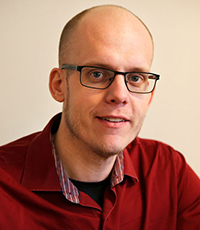Press release -
Customer demand moves production home again
“Production in countries far away is hard to combine with customers who demand to have their goods straight away as well as customised to their needs,” says Professor Per Hilletofth, the University of Gävle.
Companies moved from Sweden to decrease production cost, but it has become clear that this move involves problems, for instance regarding quality, delivery, competence, rights and infrastructure.
As a result, production is returning to Sweden.

“What happened was that people only saw production cost and failed to recognise all hidden costs involved. The total cost for delivering the product to the market includes transport, quality shortcomings and storage, and, if all those had been considered, the decision might have been different,” Per Hilletofth says.
The Supply Chain
In many markets and industries, the trend today is that customers demand to be able customise their products. The life cycle for most products today is short, as there is a constant demand for new models.
“It is very problematic to combine a domestic market, which is moving towards unique article numbers, with a long supply chain involving high volume production in for example China.”
“This renewal demands proximity between different functions in the supply chain, between production, market, product development and logistics. The whole process needs to work and for this reason production must come closer.”
A sustainable trade mark
Yet another incentive for the companies to move back their production is their strive for a more distinct sustainability profile.
“It is easier to run a sustainable business in Sweden than in many other countries in the world, and you can accept slightly higher costs as a stronger sustainability profile can increase sales.”
“Purchased businesses often choose to retain production in Sweden, since this often benefits trademarking.”
Support to local businesses
Researchers at the University of Gävle intend to provide decision support to help businesses in the region to make sustainable decisions regarding the localisation of production, decision where the total supply chain is taken into account.
“We are looking for businesses in the region interested in gaining more knowledge in the field. We would like to form a group of businesses who find these issues exciting, and a starting point will be a seminar in June,” Per Hilletofth says.
--------------------------------------------------------------------------
A study made by Per Hilletofth and some of his colleagues showed that businesses gave three reasons why they had moved production back to Sweden. They wanted to increase customisation, flexibility and decrease the time span between order and delivery.
--------------------------------------------------------------------------
For more information, please Contact:
Per Hilletofth, Professor in Logistics at the University of Gävle.
Tel: 072-226 83 81
Email: per.hilletofth@hig.se
Topics
- Economy
Categories
- the supply chain
- per hilletofth
- reshoring
- research
- sustainable living environment
- university of gävle
Education and Research at a Scenic Campus.
The University of Gävle has approximately 17 000 students, more than 50 study programmes and second-cycle programmes, about 1 000 courses in humanities, social and natural sciences and technology.
Research Profiles
Built Environment and Health-promoting Working Life are the general research profiles of the higher education institution. Important parts included are Spatial Planning with a specialisation in Sustainable Built Environment and Musculoskeletal Disorders with the purpose to prevent work-related injuries. In 2010, the higher education institution received permission to carry out third-cycle programmes in the profile area of Built Environment.
The higher education institution has applied for permission to carry out third-cycle programmes in technology, humanities and social sciences.
